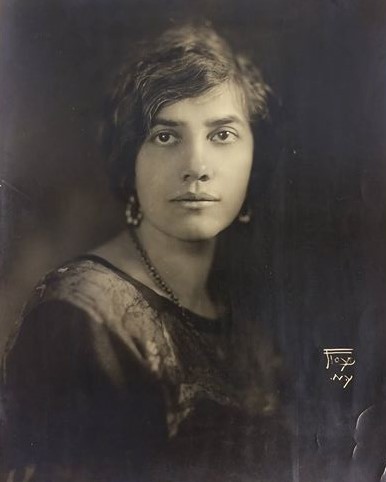Husband
Maurice Browne
Queer Places:
Fine Arts Building, 410-418 S Michigan Ave, Chicago, IL 60605
 Ellen Van Volkenburg (October 8, 1882 – December 15, 1978), born Nellie Van
Volkenburg in
Battle Creek,
Michigan,
the daughter of Frank Hoyt Van Volkenburg and Juliet Cooper. She was a leading actress, director, puppeteer and theater educator in the
United States and the
UK.
Educated at the
University of Michigan (A.B., member of the Alpha Phi), Van Volkenburg has been credited, along with her
then-husband Englishman
Maurice Browne
(married in Chicago on June 1, 1912),
with being the founder of the
Little Theatre Movement in America through their work with the
Chicago Little Theatre.[1]
Van Volkenburg and Browne went on to found the department of drama at the
Cornish School in
Seattle in
1918, now
Cornish College of the Arts.[2]
Although she divorced Maurice Browne in 1922, for much of her life she signed
herself "Ellen Van Volkenburg Browne." She had a 15-year intimate relationship
with a woman.
Ellen Van Volkenburg (October 8, 1882 – December 15, 1978), born Nellie Van
Volkenburg in
Battle Creek,
Michigan,
the daughter of Frank Hoyt Van Volkenburg and Juliet Cooper. She was a leading actress, director, puppeteer and theater educator in the
United States and the
UK.
Educated at the
University of Michigan (A.B., member of the Alpha Phi), Van Volkenburg has been credited, along with her
then-husband Englishman
Maurice Browne
(married in Chicago on June 1, 1912),
with being the founder of the
Little Theatre Movement in America through their work with the
Chicago Little Theatre.[1]
Van Volkenburg and Browne went on to found the department of drama at the
Cornish School in
Seattle in
1918, now
Cornish College of the Arts.[2]
Although she divorced Maurice Browne in 1922, for much of her life she signed
herself "Ellen Van Volkenburg Browne." She had a 15-year intimate relationship
with a woman.
The most notable work in American puppets was done in Chicago under the
direction of Maurice Browne and Ellen Van Volkenburg, with productions that
included A Midsummer Night’s Dream in 1916. She developed the art, carried her work from Chicago to New York, and across the continent to San Francisco and Seattle in 1918-1919. Here she founded puppet groups and worked with
Nellie Cornish at the Cornish School of the Theatre. Ellen VanVolkenburg and Nellie Cornish were responsible for training the first group of professional puppeteers on the West
Coast.
Among the outstanding students trained in the art of puppetry at the Cornish School of the Theatre was Grace Barnes, one of the first professional puppeteers in Los Angeles. She toured with puppet shows on the Pacific Coast during 1914-1923. While traveling in the north, the company was known as the Cornish Puppeteers; later the name was changed to the Grace Barnes Puppet Group. By 1924 Grace Barnes and her associates played at the Gamut Club in Los Angeles. A circus show, "Peter Rabbit," "Aladdin," and other acts were presented. Among the features of the shows were the beautiful puppets which Ellen Van Volkenburg had purchased in Europe; she allowed Miss Barnes to use them for her performances.
Van Volkenburg later directed plays for Tony
Sarg, who became the most important influence in American puppetry, with such
large-scale marionette plays as Rip Van Winkle, The Rose and the Ring,
and Alice in Wonderland.
.jpg)
Fine Arts Building, Chicago
My published books:


BACK TO HOME PAGE
- https://en.wikipedia.org/wiki/Ellen_Van_Volkenburg
-
https://en.wikisource.org/wiki/Page:Woman%27s_who%27s_who_of_America,_1914-15.djvu/125
-
Baim, Tracy. Out and Proud in Chicago: An Overview of the City's Gay
Community . Agate Publishing. Edizione del Kindle.
 Ellen Van Volkenburg (October 8, 1882 – December 15, 1978), born Nellie Van
Volkenburg in
Battle Creek,
Michigan,
the daughter of Frank Hoyt Van Volkenburg and Juliet Cooper. She was a leading actress, director, puppeteer and theater educator in the
United States and the
UK.
Educated at the
University of Michigan (A.B., member of the Alpha Phi), Van Volkenburg has been credited, along with her
then-husband Englishman
Maurice Browne
(married in Chicago on June 1, 1912),
with being the founder of the
Little Theatre Movement in America through their work with the
Chicago Little Theatre.[1]
Van Volkenburg and Browne went on to found the department of drama at the
Cornish School in
Seattle in
1918, now
Cornish College of the Arts.[2]
Although she divorced Maurice Browne in 1922, for much of her life she signed
herself "Ellen Van Volkenburg Browne." She had a 15-year intimate relationship
with a woman.
Ellen Van Volkenburg (October 8, 1882 – December 15, 1978), born Nellie Van
Volkenburg in
Battle Creek,
Michigan,
the daughter of Frank Hoyt Van Volkenburg and Juliet Cooper. She was a leading actress, director, puppeteer and theater educator in the
United States and the
UK.
Educated at the
University of Michigan (A.B., member of the Alpha Phi), Van Volkenburg has been credited, along with her
then-husband Englishman
Maurice Browne
(married in Chicago on June 1, 1912),
with being the founder of the
Little Theatre Movement in America through their work with the
Chicago Little Theatre.[1]
Van Volkenburg and Browne went on to found the department of drama at the
Cornish School in
Seattle in
1918, now
Cornish College of the Arts.[2]
Although she divorced Maurice Browne in 1922, for much of her life she signed
herself "Ellen Van Volkenburg Browne." She had a 15-year intimate relationship
with a woman..jpg)
